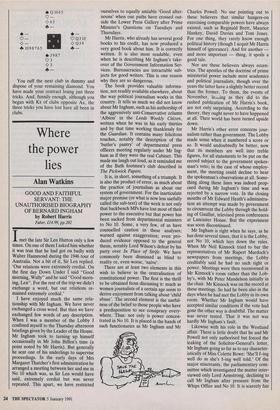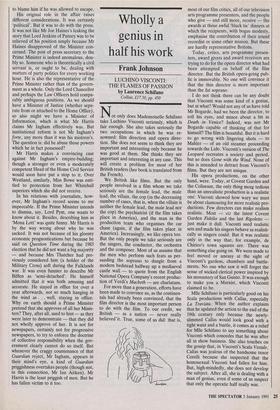Where the power lies
Alan Watkins
GOOD AND FAITHFUL SERVANT: THE UNAUTHORISED BIOGRAPHY OF BERNARD INGHAM by Robert Harris Faber, f14.99, pp.202 Imet the late Sir Len Hutton only a few times. On one of them I asked him whether it was true that he had got on badly with Walter Hammond during the 1946 tour of Australia. Not a bit of it, Sir Len replied. `Our relations were extremely cordial. On the first day Down Under I said "Good morning, Wally" and he said "Good morn- ing, Len". For the rest of the trip we didn't exchange a word, but our relations re- mained extremely cordial.'
I have enjoyed much the same rela- tionship with Mr Ingham. We have never exchanged a cross word. But then we have exchanged few words of any description. When I was a member of the Lobby I confined myself to the Thursday afternoon briefings given by the Leader of the House. Mr Ingham took to turning up himself occasionally in Mr John Biffen's time (a point noted by Mr Harris). But generally he sent one of his underlings to supervise proceedings. In the early days of Mrs Margaret Thatcher's first administration he arranged a meeting between her and me in No 10 which was, as Sir Len would have said, extremely cordial but was never repeated. This apart, we have restricted ourselves to equally amiable 'Good after- noons' when our paths have crossed out- side the Lower Press Gallery after Prime Minister's Questions on Tuesdays and Thursdays.
Mr Harris, who already has several good books to his credit, has now produced a very good book about him. It is correctly written. It is also most readable, even when he is describing Mr Ingham's take- over of the Government Information Ser- vices. Bureaucracies are intractable sub- jects for good writers. This is one reason why they are so dangerous.
The book provides valuable informa- tion, not readily available elsewhere, about the way political journalism works in this country. It tells us much we did not know about Mr Ingham, such as his authorship of the aggressively anti-Conservative column `Albion' in the Leeds Weekly Citizen, written when he was in his early thirties and by that time working thanklessly for the Guardian. It contains many felicitous touches, notably the description of the `butler's pantry' of departmental press officers meeting regularly under Mr Ing- ham as if they were the real Cabinet. This made me laugh out loud, as it reminded me of the Bath footmen's club described in The Pickwick Papers.
It is, in short, something of a triumph. It is also the product of error, as much about the practice of journalism as about our system of government. For the inarticulate major premise (or what is now less usefully called the sub-text) of the work is not only that backbench MPs have lost most of their power to the executive but that power has been sucked from departmental ministers to No 10. Some, a very few, of us have counselled caution in these analyses; warned against exaggeration; even pth- duced evidence opposed to the general thesis, notably Lord Wilson's defeat by his party over In Place of Strife. We have commonly been dismissed as blind to reality or, even worse, `naive'.
There are at least two elements in this wish to believe in the centralisation of constitutional power. The first is the thrill to be obtained from discussing it: much as women journalists of a certain age seem to derive enjoyment from talking about 'child abuse'. The second element is the useful- ness of the belief to those people who have a predisposition to see consipracy every- where. Thus: not only is power concen- trated in No 10. It is placed in the hands of such functionaries as Mr Ingham and Mr Charles Powell. No use pointing out to these believers that similar hangers-on exercising comparable powers have always existed, such as Reginald Brett, Maurice Hankey, David Davies and Tom Jones. For one thing, they rarely know enough political history (though I acquit Mr Harris himself of ignorance). And for another and more important — thing, it spoils a good tale.
Nor are these believers always eccen- trics. The apostles of the doctrine of prime ministerial power include most academics and political journalists, though over the years the latter have a slightly better record than the former. To them, the events of November, leu...ing as they did to the rushed publication of Mr Harris's book, are not only surprising. According to the theory, they ought never to have happened at all. Their world has been turned upside down.
Mr Harris's other error concerns jour- nalism rather than government. The Lobby made sense when it numbered a score or so. It would undoubtedly be better, now that its members are well into treble figures, for all statements to be put on the record subject to the government spokes- man's veto; in the case of whose employ- ment, the meeting could decline to hear the spokesman's observations at all. Some- thing along these lines was indeed prop- osed during Mr Ingham's time and was rejected by a narrow vote. In the closing months of Mr Edward Heath's administra- tion an attempt was made by government to circumvent the Lobby through the hold- ing of Gaullist, televised press conferences at Lancaster House. But the experiment was soon discontinued.
Mr Ingham is right when he says, as he has done several times, that it is the Lobby, not No 10, which lays down the rules. When Mr Neil Kinnock tried to bar the representatives of Mr Rupert Murdoch's newspapers from meetings, the Lobby creditably said he had no such right or power. Meetings were then reconvened in Mr Kinnock's room rather than the Lob- by's, with Mr Peter Mandelson initially in the chair. Mr Kinnock was on the record at these meetings. So had he been also in the days when he had met the Lobby in its own room. Whether Mr Ingham would have accepted similar conditions if the vote had gone the other way is doubtful. The matter was never tested. That it was not was hardly Mr Ingham's fault.
Likewise with his role in the Westland affair. There is little doubt that he and Mr Powell not only authorised but forced the leaking of the Solicitor-General's letter, Mr Ingham going so far as to say character- istically of Miss Colette Bowe: `She'll f–ing well do as she's f–ing well told.' Of the major miscreants, the parliamentary com- mittee which investigated the matter inter- viewed only Lord Armstrong, declining to call Mr Ingham after pressure from the Whips Office and No 10. It is scarcely fair to blame him if he was allowed to escape.
His original role in the affair raises different considerations. It was certainly `political'. But it was to do with the press. It was not like Mr Joe Haines's leaking the story that Lord Jenkins of Putney was to be relieved of his position simply because Mr Haines disapproved of the Minister con- cerned. The post of press secretary to the Prime Minister is indeed anomalous, dou- bly so. Someone who is theoretically a civil servant is, or ought to be, dealing with matters of party politics for every working hour. He is also the representative of the Prime Minister rather than of the govern- ment as a whole. Only the Lord Chancellor and perhaps the Law Officers hold compa- rably ambiguous positions. As we should have a Minister of Justice (whether sepa- rate from or attached to the Home Office), so also might we have a Minister of Information, which is what Mr Harris claims Mr Ingham effectively was. But institutional reform is not Mr Ingham's forte, any more than it was his mistress's. The question is: did he abuse those powers which he in fact possessed?
Mr Harris makes a convincing case against Mr Ingham's empire-building; though a stronger or even a moderately competent Head of the Home Civil Service would soon have put a stop to it. Over Westland, similarly, Miss Bowe was enti- tled to protection from her Whitehall superiors which she did not receive.
In his relations with journalists, how- ever, Mr Ingham's record seems to me impeccable. If the Prime Minister intends to dismiss, say, Lord Pym, one wants to know about it. Besides, describing him as `Mona Lott' was quite funny. Mr Harris is by the way wrong about why he was sacked. It was not because of his gloomy economic prognostications but because he said on Question Time during the 1983 election that he did not want a big majority — and because Mrs Thatcher had pre- viously considered him (a holder of the Military Cross) soft during the Falklands war. It was even funnier to describe Mr Biffen as 'semi-detached'. He himself admitted that it was both amusing and accurate. He stayed in office for over a year afterwards, not so much hanging in the wind as . . . well, staying in office.
Why on earth should a Prime Minister pretend that she approves of all her Minis- ters? They, after all, used to hint — as they were later to demonstrate — that they did not wholly approve of her. It is not for newspapers, certainly not for progressive newspapers, to try to enforce the doctrine of collective responsibility when the gov- ernment clearly cannot do so itself. But whenever the craggy countenance of that Guardian reject, Mr Ingham, appears in their mind's eye, a kind of Guardian priggishness overtakes people (though not, in this connection, Mr Ian Aitken). Mr Harris is the least priggish of men. But he has fallen victim to it too.











































 Previous page
Previous page